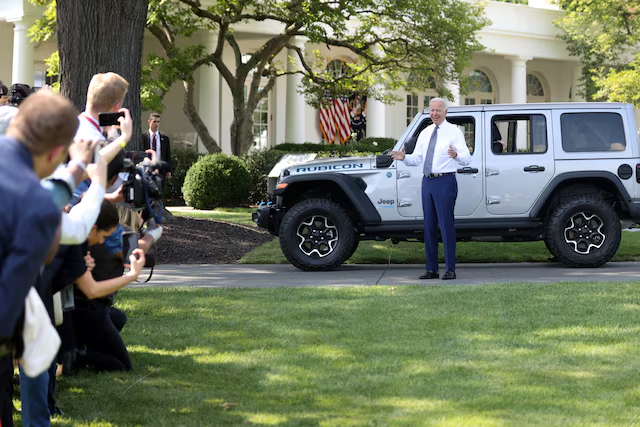Miami Beach Takes a Significant Step Towards Sustainability with Gas-Powered Vehicle Ban by 2035
Introduction
In a groundbreaking initiative that positions Miami Beach as a leader in environmental reform, the city commission has enacted a historic ordinance prohibiting the sale of new gas-powered vehicles by the year 2035. This progressive decision, which garnered overwhelming support from both the city officials and the community, marks a pivotal step in the city’s broader climate and sustainability agenda. Miami Beach is not only aiming to reduce its carbon footprint but also set a precedent for other cities nationwide as they consider similar measures to combat climate change.
A Pivotal Announcement
Mayor Dan Gelber, during a recent press conference held at South Pointe Park, heralded the ordinance as a monumental achievement for Miami Beach. “This is about protecting our future, our environment, and our economy,” he said, emphasizing the importance of the decision. He articulated a vision where Miami Beach serves as a model for sustainable urban living and robust climate action. This declaration resonates deeper within a city that faces unique ecological challenges, such as rising sea levels and extreme weather events, making it imperative for local leaders to take bold actions.
Key Components of the Ordinance
The ordinance encapsulates several critical components aimed at easing the transition to a more sustainable transportation framework. The first significant provision is the outright 2035 ban on the sale of new gas-powered vehicles, paving the way for a cleaner, electric vehicle future. To incentivize early adoption of electric vehicles (EVs), the city plans to roll out various measures starting in 2030, including enhanced tax credits. Furthermore, Miami Beach will see the introduction of 10,000 new public charging stations over the coming five years, coupled with commitments to electrify the public transportation fleet by 2030, thereby fast-tracking the city’s transition to electric mobility.
Environmental and Community Impact
The environmental implications of this ordinance are significant, particularly for a coastal city like Miami Beach, which is situated in a region increasingly vulnerable to climate change effects. Local environmental advocates, including Alyssa Tran from Clean Florida Now, have expressed their support for the ordinance. Tran stated, “This is not just about clean air—it’s about ensuring the survival of a community that’s on the frontlines of the climate crisis.” The alignment of Miami Beach’s policies with global efforts to combat climate change demonstrates a commitment to a sustainable future while addressing the urgent issues of air quality and climate resilience.
Addressing Criticism
Despite widespread acclaim, the ordinance has faced criticism from some community members concerned about potential financial burdens placed on small businesses and residents who depend on older vehicles. In light of these concerns, city officials have committed to implementing supportive measures, including offering subsidies and grants to assist with the transition. Additionally, programs aimed at ensuring equitable access to electric vehicles are being developed, showcasing Miami Beach’s dedication to addressing the needs of all its residents as it embraces this significant change.
National Implications
This forward-thinking decision by Miami Beach is set to ripple across the nation. As the city steps into the limelight as a model for sustainable urban policies, it may inspire other coastal cities grappling with similar environmental challenges to adopt analogous regulations. By taking decisive action, Miami Beach is not only addressing local issues but is also contributing to a national dialogue on sustainable transportation and climate resilience, highlighting the importance of municipal leadership in the face of global environmental challenges.
A Vision for the Future
“This is the start of something much bigger,” Mayor Gelber remarked, emphasizing the broader implications of the ordinance for Miami Beach and beyond. As the city prepares to lead this charge towards electro-mobility, its efforts signal a notable shift in societal attitudes towards sustainability and climate responsibility. Miami Beach is poised to spearhead a wave of change, proving that ambitious and meaningful reform is not only necessary but achievable.
Conclusion
Miami Beach’s historic ban on gas-powered vehicles by 2035 represents a monumental commitment to sustainable living and environmental stewardship. Through its comprehensive approach, which combines regulatory measures with community support and incentives, the city is taking a bold step towards a cleaner, greener future. This initiative serves as a blueprint for urban sustainability efforts across the nation, urging other cities to follow suit and address the pressing challenges posed by climate change.
FAQs
What is the timeline for implementing the gas vehicle ban in Miami Beach?
The ban on the sale of new gas-powered vehicles will come into effect in 2035, with various supportive measures like EV incentives starting in 2030.
How will the city support residents and businesses affected by this ordinance?
Miami Beach plans to offer subsidies and grants to assist with the transition to electric vehicles and develop programs to ensure equitable access for all residents.
What specific measures will be taken to increase electric vehicle adoption?
The city will implement expanded tax credits for electric vehicle purchases, install 10,000 new public charging stations, and electrify its public transportation fleet by 2030.
Why is Miami Beach focusing on electric vehicles specifically?
Given the city’s vulnerability to rising sea levels and climate change impacts, transitioning to electric vehicles is seen as a vital step in reducing carbon emissions and promoting a sustainable future.

